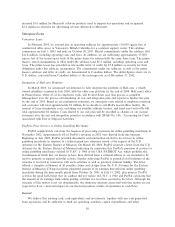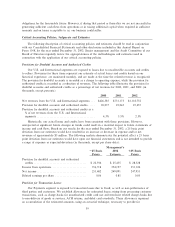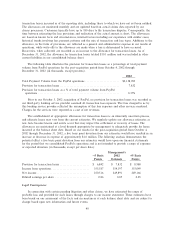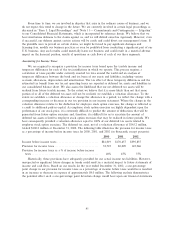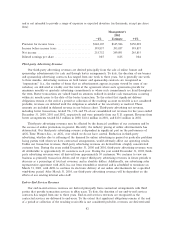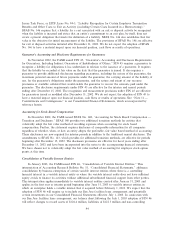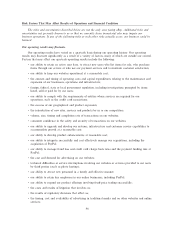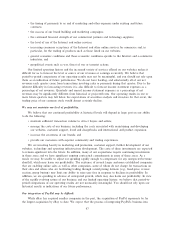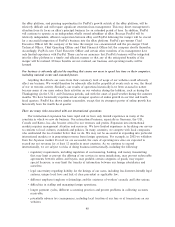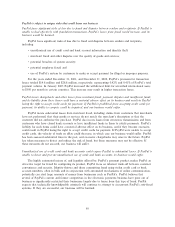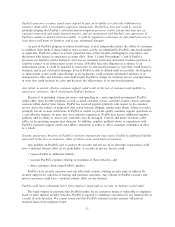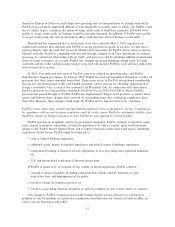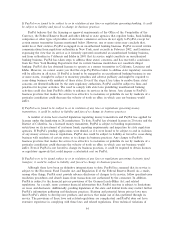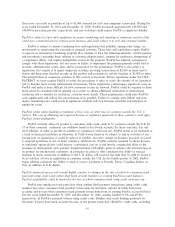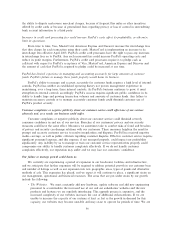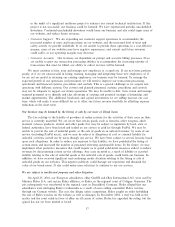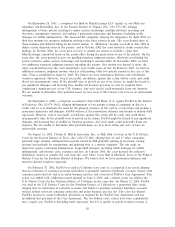eBay 2002 Annual Report Download - page 50
Download and view the complete annual report
Please find page 50 of the 2002 eBay annual report below. You can navigate through the pages in the report by either clicking on the pages listed below, or by using the keyword search tool below to find specific information within the annual report.the eBay platform, and pursuing opportunities for PayPal's growth outside of the eBay platform, will be
relatively diÇcult and will require signiÑcant attention from management. This may divert management's
attention from its focus on eBay's principal business for an extended period of time. In addition, PayPal
will continue to operate as an independent wholly owned subsidiary of eBay. Because PayPal will be
relatively independent, eÇcient cooperation between eBay and PayPal following the merger will be crucial
for a successful integration of PayPal's business into the eBay platform. PayPal's pre-merger Chief
Executive OÇcer left the company at the time the merger was consummated and the pre-merger Chief
Technical OÇcer, Chief Operating OÇcer and Chief Financial OÇcer left the company shortly thereafter.
Accordingly, PayPal's new Chief Executive OÇcer and certain other members of its management have
only limited experience with PayPal. There can be no assurance that PayPal's business will be integrated
into the eBay platform in a timely and eÇcient manner or that any of the anticipated beneÑts of the
merger will be realized. If these beneÑts are not realized, our business and operating results will be
harmed.
Our business is adversely aÅected by anything that causes our users to spend less time on their computers,
including national events and seasonal factors.
Anything that diverts our users from their customary level of usage of our websites could adversely
aÅect our business. We would therefore be adversely aÅected by geopolitical events such as war, the threat
of war or terrorist activity. Similarly, our results of operations historically have been seasonal in nature
because many of our users reduce their activities on our websites during the holidays, such as during the
Thanksgiving (in the U.S.) and Christmas periods, and with the onset of good weather during the summer
months. We have historically experienced our strongest quarters of online growth in our Ñrst and fourth
Ñscal quarters. PayPal has shown similar seasonality, except that its strongest quarter of online growth has
historically been the fourth Ñscal quarter.
There are many risks associated with our international operations.
Our international expansion has been rapid and we have only limited experience in many of the
countries in which we now do business. Our international business, especially in Germany, the U.K.,
Canada and Korea, has also become critical to our revenues and proÑts. Expansion into international
markets requires management attention and resources. We have limited experience in localizing our service
to conform to local cultures, standards and policies. In many countries, we compete with local companies
who understand the local market better than we do. We may not be successful in expanding into particular
international markets or in generating revenues from foreign operations. For example, in 2002 we withdrew
from the Japanese market. Even if we are successful, the costs of operating new sites are expected to
exceed our net revenues for at least 12 months in most countries. As we continue to expand
internationally, we are subject to risks of doing business internationally, including the following:
‚ regulatory requirements, including regulation of auctioneering, banking, and money transmitting,
that may limit or prevent the oÅering of our services in some jurisdictions, may prevent enforceable
agreements between sellers and buyers, may prohibit certain categories of goods, may require
special licensure, or may limit the transfer of information between our foreign subsidiaries and
ourselves;
‚ legal uncertainty regarding liability for the listings of our users, including less Internet-friendly legal
systems, unique local laws and lack of clear precedent or applicable law;
‚ diÅerent employee/employer relationships and the existence of workers' councils and labor unions;
‚ diÇculties in staÇng and managing foreign operations;
‚ longer payment cycles, diÅerent accounting practices and greater problems in collecting accounts
receivable;
‚ potentially adverse tax consequences, including local taxation of our fees or of transactions on our
websites;
48


